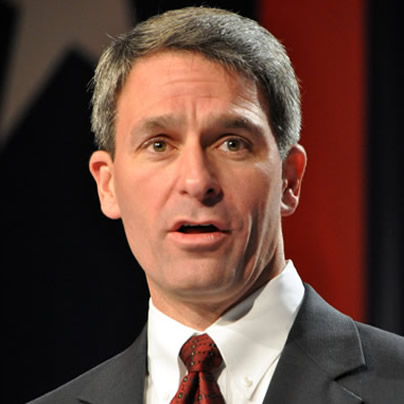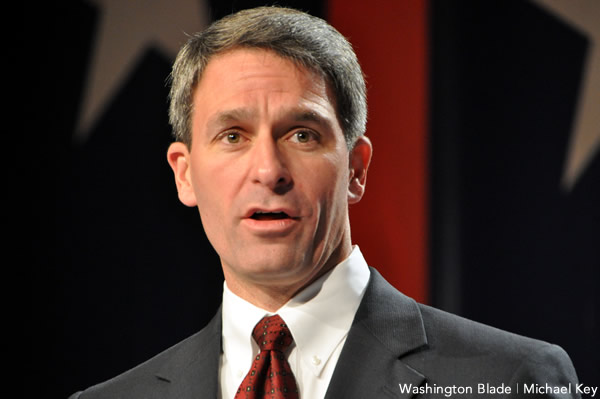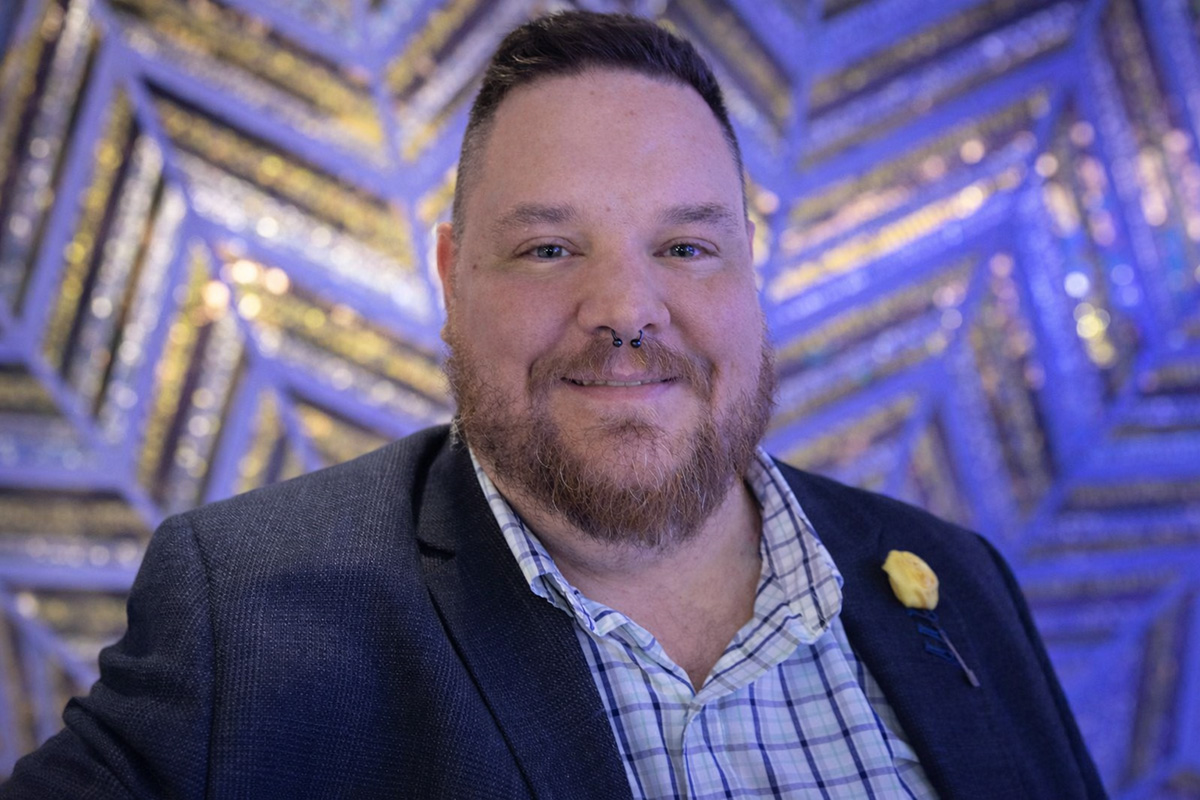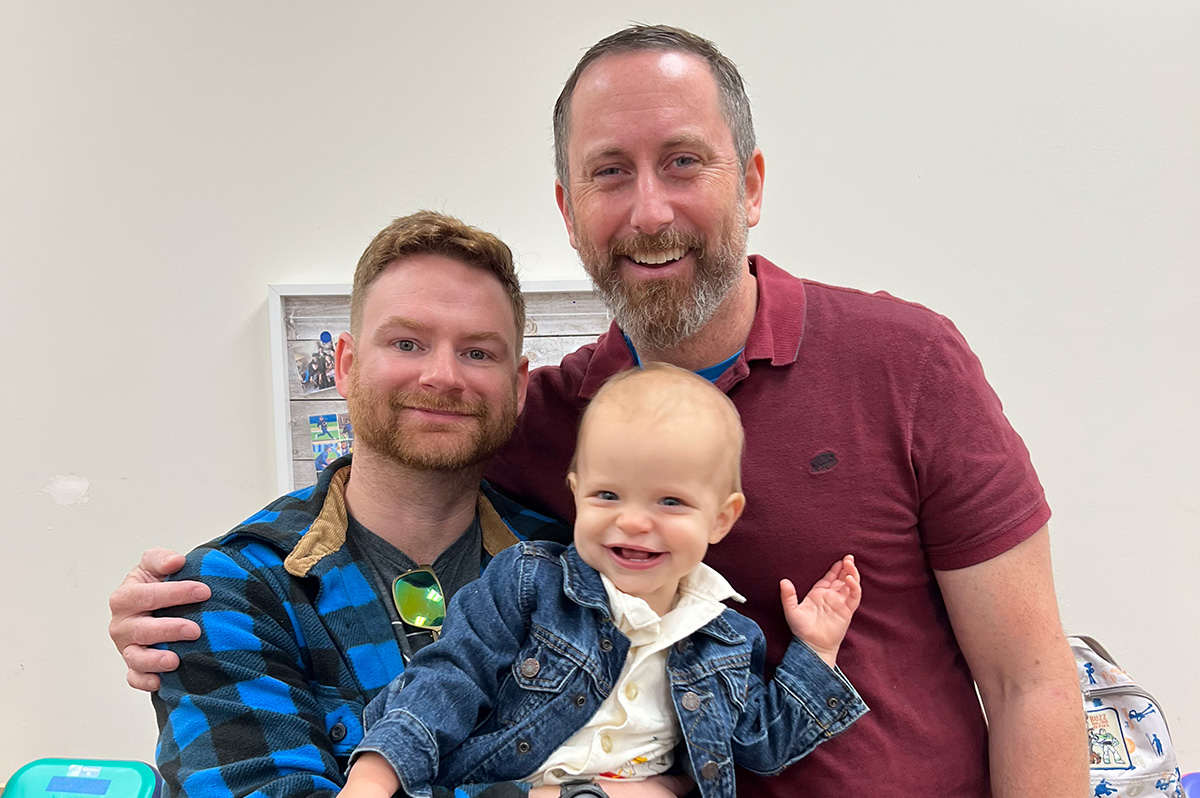Local
Supreme Court denies Cuccinelli appeal of Va. sodomy law ruling
Action upholds lower court ruling striking down law


The high court declined to hear a case brought by Virginia Attorney General Ken Cuccinelli related to the commonwealth’s sodomy law. (Washington Blade file photo by Michael Key)
The U.S. Supreme Court on Monday denied a petition by Virginia Attorney General Ken Cuccinelli seeking to appeal a lower court ruling declaring the state’s Crimes Against Nature or sodomy law unconstitutional.
By refusing to hear the case, the high court allowed a decision in March striking down the law by the Fourth Circuit U.S. Court of Appeals in Richmond to stand, ending efforts by Cuccinelli and other officials to get the state’s ban on oral and anal sex between consenting adults reinstated.
“Under any circumstances this is definitely a victory and it’s a good one,” said Claire Gastanaga, executive director of the ACLU of Virginia. “It puts to rest this idea that somehow you can have a statute that’s found unconstitutional but you can still be prosecuted under it.”
Gastanaga was referring to the Supreme Court’s landmark 2003 decision of Lawrence v. Texas that overturned state sodomy laws. A three-judge panel of the Fourth Circuit Court of Appeals cited the Lawrence decision as the basis for its decision in March to overturn Virginia’s Crimes Against Nature statute, saying it could no longer be enforced under any circumstances.
Cuccinelli has contended that the Lawrence decision doesn’t apply to cases involving sex between adults and minors. As a candidate for governor, Cuccinelli launched a special campaign website earlier this year claiming removal of the sodomy law would prevent law enforcement officials from prosecuting “child predators.”
LGBT rights attorneys have disputed that claim, saying existing state laws enable police and prosecutors to arrest and prosecute anyone who sexually abuses a minor.
The Fourth Circuit appeals court decision struck down a felony conviction by a judge in the city of Colonial Heights, Va., of a 47-year-old man for soliciting oral sex from a 17-year-old woman. Although no sex took place, the defendant, William Scott MacDonald, had been charged with soliciting someone to commit a sexual act that his attorneys argued was no longer illegal under the Lawrence decision.
In its 2-1 ruling, the appeals court panel declared that the Lawrence decision invalidated the Virginia Crimes Against Nature law as “facially” unconstitutional, preventing it from being enforced, even in cases of consensual sodomy between an adult and a minor if the minor is between the ages of 15 and 18. The judges noted that the age of sexual consent in Virginia is 15.
Cuccinelli’s office issued a statement on Monday saying the elimination of the sodomy law “puts tools prosecutors need to protect children in jeopardy.”
According to the statement, Cuccinelli’s efforts to keep the law on the books “was never about sexual orientation or private acts between consenting adults” but instead was about enabling law enforcement officials to “prosecute child predators.”
Attorneys familiar with the case — including prosecutors in Arlington and Alexandria — have said existing state laws give law enforcement officials the ability to prosecute all cases of forcible or coerced sex between an adult and a minor as a felony. They say that heterosexual intercourse between a minor within the age range of 15 through 17 and an adult can still be prosecuted as a misdemeanor. But with the elimination of the state sodomy law, consenting oral or anal sex among minors — gay or straight — between age 15 and 17 and an adult is fully legal and can’t be prosecuted until or unless the legislature changes the law.
Gastanaga and others familiar with Cuccinelli’s concerns have called on the Virginia General Assembly to revise the existing laws addressing the age of consent or sex with minors in a way that doesn’t violate the Constitution as spelled out in the Lawrence decision.
“That means you’ve got to do the hard work of getting together with the Commonwealth’s Attorneys and public defenders and other criminal defense lawyers and legislators and people like us and try to work out something that does address what you want to address, which is sexual activity that is not constitutionally protected,” Gastanaga said.
James Parrish, executive director of the statewide LGBT group Equality Virginia, said his organization would not oppose legislation that reforms existing laws to address potential problems resulting from the striking down of the sodomy law.
“This is something the Supreme Court decided now more than 10 years ago,” Parrish said. “We understand that the attorney general and others have some concerns of how the sodomy law was intertwined with other laws. They have had 10 years to make those laws more clear and we would hope they would work with the General Assembly to address these concerns” in a way that doesn’t violate the Lawrence decision’s protections pertaining to consenting adults, he said.
Although Cuccinelli criticized his Democratic opponent, businessman Terry McAuliffe, for expressing support for overturning the Virginia sodomy law, McAuliffe was leading Cuccinelli by a 42 to 37 percent margin in one of the most recent public opinion polls conducted by Virginia’s Hampton University.
Josh Schwerin, McAuliffe’s press secretary, said Cuccinelli demonstrated “an extreme agenda and uncompromising approach” by refusing in the past to support legislation to update Virginia’s laws to conform to the Supreme Court ruling on sodomy.
“Everyone supports strong laws to protect children and, like most Virginians, Terry believes our law should be updated to both conform with court rulings and allow prosecution of predators,” Schwerin said. “As he admitted as recently as 2009, Ken Cuccinelli is one of the only elected officials in America who believes that being gay should result in criminal prosecution and jail time,” he said.
Under the Supreme Court’s rules, at least four of the court’s nine justices must vote to hear a case in order for the court to consider a case on its merits. The court never discloses how individual justices vote or what the vote count was when it decides whether or not to take a case.
However, in August Supreme Court Chief Justice John Roberts issued a ruling denying a separate petition by Cuccinelli asking the court to put a stay on the Fourth Circuit Court of Appeals ruling striking down the Virginia sodomy law until the Supreme Court decided whether or not to take the case. Roberts did not issue an explanation for denying Cuccinelli’s request for a stay.

The Comings & Goings column is about sharing the professional successes of our community. We want to recognize those landing new jobs, new clients for their business, joining boards of organizations and other achievements. Please share your successes with us at [email protected].
The Comings & Goings column also invites LGBTQ+ college students to share their successes with us. If you have been elected to a student government position, gotten an exciting internship, or are graduating and beginning your career with a great job, let us know so we can share your success.
Congratulations to R. Warren Gill III, M.Div., M.A. on being appointed as the development manager at HIPS. Upon his appointment, Gill said, “For as long as I’ve lived in Washington, D.C., I’ve followed and admired the life-saving work HIPS does in our communities. I’m proud to join the staff and help strengthen the financial support that sustains this work.”
Gill will lead fundraising strategy, donor engagement, and institutional partnerships. HIPS promotes the health, rights, and dignity of individuals and communities impacted by sexual exchange and/or drug use due to choice, coercion, or circumstance. HIPS provides compassionate harm reduction services, advocacy, and community engagement that is respectful, non-judgmental, and affirms and honors individual power and agency.
Gill has built a career at the intersection of progressive politics, advocacy, and nonprofit leadership. Previously he served as director of communications at AIDS United, supporting national efforts to end the HIV epidemic. Prior to that he had roles including; being press secretary for Sen. Bernie Sanders during the 2016 presidential primary, and working with the General Board of Church and Society, the United Methodist Church, the denomination’s social justice and advocacy arm.
Gill earned his bachelor’s degree in philosophy and religious studies, Jewish Studies, Stockton University; his master’s degree in political communication from American University, where his graduate research focused on values-based messaging and cognitive linguistics; and his master of Divinity degree from the Pacific School of Religion.
District of Columbia
Judge denies D.C. request to dismiss gay police captain’s anti-bias lawsuit
MPD accused of illegally demoting officer for taking family leave to care for newborn child

A U.S. District Court judge on Jan. 21 denied a request by attorneys representing the D.C. Metropolitan Police Department to dismiss a lawsuit filed by a gay captain accusing police officials of illegally demoting him for taking parental leave to join his husband in caring for their newborn son.
The lawsuit filed by Capt. Paul Hrebenak charges that police officials violated the U.S. Family and Medical Leave Act, a similar D.C. family leave law, and the Constitution’s Equal Protection Clause by refusing to allow him to return to his position as director of the department’s School Safety Division upon his return from parental leave.
It says police officials transferred Hrebenak to another police division against his wishes, which was a far less desirable job and was the equivalent of a demotion, even though it had the same pay grade as his earlier job.
In response to a motion filed by attorneys with the Office of the D.C. Attorney General, which represents and defends D.C. government agencies against lawsuits, Judge Randolph D. Moss agreed to dismiss seven of the lawsuit’s 14 counts or claims but left in place six counts.
Scott Lempert, the attorney representing Hrebenak, said he and Hrebenak agreed to drop one of the 14 counts prior to the Jan. 21 court hearing.
“He did not dismiss the essential claims in this case,” Lempert told the Washington Blade. “So, we won is the short answer. We defeated the motion to dismiss the case.”
Gabriel Shoglow, a spokesperson for the Office of the D.C. Attorney General, said the office has a policy of not commenting on pending litigation and it would not comment on the judge’s ruling upholding six of the lawsuit’s initial 14 counts.
In issuing his ruling from the bench, Moss gave Lempert the option of filing an amended complaint by March 6 to seek the reinstatement of the counts he dismissed. He gave attorneys for the D.C. attorney general’s office a deadline of March 20 to file a response to an amended complaint.
Lempert told the Blade he and Hrebenak have yet to decide whether to file an amended complaint or whether to ask the judge to move the case ahead to a jury trial, which they initially requested.
In its 26-page motion calling for dismissal of the case, filed on May 30, 2025, D.C. Office of the Attorney General attorneys argue that the police department has legal authority to transfer its officers, including captains, to a different job. It says that Hrebenak’s transfer to a position of watch commander at the department’s First District was fully equivalent in status to his job as director of the School Safety Division.
“The Watch Commander position is not alleged to have changed plaintiff’s rank of captain or his benefits or pay, and thus plaintiff has not plausibly alleged that he was put in a non-equivalent position,” the motion to dismiss states.
“Thus, his reassignment is not a demotion,” it says. “And the fact that his shift changed does not mean that the position is not equivalent to his prior position. The law does not require that every single aspect of the positions be the same.”
Hrebenak’s lawsuit states that “straight” police officers have routinely taken similar family and parental leave to care for a newborn child and have not been transferred to a different job. According to the lawsuit, the School Safety Division assignment allowed him to work a day shift, a needed shift for his recognized disability of Crohn’s Disease, which the lawsuit says is exacerbated by working late hours at night.
The lawsuit points out that Hrebenak disclosed he had Crohn’s Disease at the time he applied for his police job, and it was determined he could carry out his duties as an officer despite this ailment, which was listed as a disability.
Among other things, the lawsuit notes that Hrebenak had a designated reserved parking space for his earlier job and lost the parking space for the job to which he was transferred.
“Plaintiff’s removal as director at MPD’s School Safety Division was a targeted, premeditated punishment for his taking statutorily protected leave as a gay man,” the lawsuit states. “There was no operational need by MPD to remove plaintiff as director of MPD’s School Safety Division, a position in which plaintiff very successfully served for years,” it says.
In another action to strengthen Hrebenak’s opposition to the city’s motion to dismiss the case, Lempert filed with the court on Jan. 15 a “Notice of Supplemental Authority” that included two controversial reports that Lempert said showed that former D.C. Police Chief Pamela Smith put in place a policy of involuntary police transfers “to effectively demote and end careers of personnel who had displeased Chief Smith and or others in MPD leadership.”
One of the reports was prepared by the Republican members of the House Oversight and Government Reform Committee and the other was prepared by the office of Jeanine Pirro, the U.S. attorney for D.C. appointed by President Donald Trump.
Both reports allege that Smith, who resigned from her position as chief effective Dec. 31, pressured police officials to change crime reporting data to make it appear that the number of violent crimes was significantly lower than it actually was by threatening to transfer them to undesirable positions in the department. Smith has denied those claims.
“These findings support plaintiff’s arguments that it was the policy or custom of MPD to inflect involuntary transfers on MPD personnel as retaliation for doing or saying something in which leadership disapproved,” Lempert says in his court filing submitting the two reports.
“As shown, many officers suffered under this pervasive custom, including Capt. Hrebenak,” he stated. “Accordingly, by definition, transferred positions were not equivalent to officers’ previous positions,” he added.
Virginia
LGBTQ rights at forefront of 2026 legislative session in Va.
Repeal of state’s marriage amendment a top priority

With 2026 ramping up, LGBTQ rights are at the forefront of Virginia politics.
The repeal of Virginia’s constitutional amendment that defines marriage as between a man and a woman is a top legislative priority for activists and advocacy groups.
The Virginia Senate on Jan. 17 by a 26-13 vote margin approved outgoing state Sen. Adam Ebbin (D-Alexandria)’s resolution that would repeal the Marshall-Newman Amendment. The Virginia House of Delegates earlier this month passed it.
Two successive legislatures must approve the resolution before it can go to the ballot.
The resolution passed in 2025. Voters are expected to consider repealing the amendment on Nov. 3.
The Virginia General Assembly opened with an introduction of a two-year budget — Virginia’s budget runs biannually.
In 2024 some funding was allocated to LGBTQ causes, and others were passed over. This year’s proposed budget leaves room for funding for a host of LGBTQ opportunities. One specific priority that Equality Virginia is promoting would ensure the state budget expands healthcare for LGBTQ individuals and extending gender affirming care.
Equality Virginia Communications Director Reed Williams told the Washington Blade the organization is also focused on passing three main budget amendments, and ensuring “LGBTQ+ students and their teachers have resources to navigate and address mental health challenges in K-12 schools.”
Along with ensuring school training, the organization wants funding in hopes of “establishing enhanced competency training for Virginia’s 988 Lifeline counselors and support staff to provide affirming care for LGBTQ+ youth.” This comes after the Trump-Vance administration shut down the specific hotline for LGBTQ young people that callers could previously reach if they called 988.
On a federal level, protections and health care access for LGBTQ people has taken a hit, as the Trump-Vance administration has continued to issue executive orders affecting the health care system. LGBTQ people no longer have federal legal health care protections, so local and state politics has become even more important for LGBTQ rights groups.
Equality Virginia has urged its supporters to call their local senators and stress the importance of voting to expand health care protections for LGBTQ people. The organization also plans to hold information sessions and a lobby day on Feb. 2.
Equality Virginia is tracking bills on its website.


















